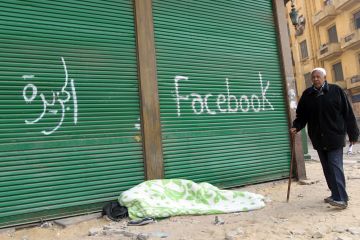The Means of Change, Familiar and New: Disentangling Revolutionary Wires in the Arab World

By Amal Ga’al:
No one really saw the Arab Spring coming. Foreign Affairs referred to the house of Assad as “sturdy” in March of last year, a description which has clearly been disproven by the scale of protests and the amount of blood that has been spilt in Syria. According to David Keyes, the moderator of the Bernstein Symposium panel titled “The Means of Change, Familiar and New”, “none of us have any idea what we’re talking about”. His comment gave rise to much laughter amongst the crowd assembled at Yale Law School on Friday afternoon. I laughed, as well, not only at Keyes’ witty opening, but at the fact that I, along with well over 50 other people, was still eagerly waiting to hear speakers make predictions about a revolutionary wave that has proven to be anything but predictable.

It is quite safe to say that the link between political unrest and technology in North Africa and the Middle East is undisputed. To claim there is no connection between the two is to ignore the widespread use of mobile technology, social media and the Internet by activists from Egypt to Bahrain. Where opinions seem to differ is around the question of the effectiveness of these mediums in bringing about social change and democracy. Members of the panel professed varying levels of optimism regarding technology in this context.
Anupam Chander, a professor of law at the University of California, Davis, is convinced that technology has fostered what he referred to as the “emergence of a people power”. He sees the Internet as dangerous and so too do the regimes which have struggled to control it, even going as far as to shut it down. While critics would point to this as an example of how easily the Internet can be foiled by the government, Chander argued that it demonstrates how much authoritarian governments fear the powerful force embodied by the Internet. He was not going as far as to say that “dictators [were] toppled by tweets”, but that Twitter, Facebook and other social media technologies are not simply “opiates of the masses” nor should their use to galvanize citizens be dismissed as “slacktivism”.
Wael Ghonim, famous Egyptian-Google-executive-turned-activist, once said “If you want to have a free society, just give them the Internet.” Rebecca MacKinnon, Bernard L. Schwartz Senior Fellow and pragmatist of the panel, would probably say that this quote, invoked by Chander, is one-sided. She sees the Internet as a tool for both good and evil. Online activism has been going on for the past decade and MacKinnon has researched the regional networks which began to form in the Middle East and North Africa far before protests began in Tunisia. She noted that the personal connections between Tunisian and Egyptian bloggers was a factor in the success of both revolutions. At the same time, in the highly sectarian states of Syria and Bahrain, the Internet has also been co-opted by pro-government bloggers and tweeters, forming “cyber armies”.
The question we should be asking ourselves now is whether or not the cyber dissident movement will translate into representation in constitution building and elections in countries that have had successful revolutions, in large part thanks to this group of tech-savvy, outraged and persistent young people. While the answer to this question does not seem to be favourable in either Egypt or Tunisia, the strength of online activism still inspires hope.
Amal Ga’al is ’14 is in Saybrook College. Contact her at amal.gaal@yale.edu.